
October 2, 2023
Dear Sisters and Brothers,
Last week at the Plenary Assembly of the Canadian Conference of Catholic Bishops (CCCB), the bishops heard of the ongoing legal and legislative evolution connected with assisted suicide—more commonly called Medical Assistance in Dying (MAiD). Locally, at a recent meeting of pastors, our priests expressed deep concern over how to respond to the increasing frequency of MAiD related issues in the pastoral care of their people. As Catholics it is important we affirm that “euthanasia/assisted suicide undermines the universal and inviolable dignity of human life and harms the building up of society” (CCCB letter, May 2023).
Rather than hopelessness and despair, it is our strong belief that those diagnosed with a terminal condition, or living in a situation of prolonged suffering, must be offered whatever life-affirming relief and hope are available. Therefore, in addition to robust medical care, patients should have access to comprehensive palliative care. In light of this, and in response to the growing culture of permissiveness related to MAiD, I recommend Catholics in our parishes educate ourselves on these important issues and grow in awareness of the role of palliative care in the alleviating of suffering.
Horizons of Hope: A Toolkit for Catholic Parishes on Palliative Care is a free practical resource to help us all be better informed. Please make use of this toolkit in your parishes whether by forming new study groups or as part of existing faith formation activities. I also encourage you to learn more about the situation in Canada on the CCCB Website (www.cccb.ca/faith-moral-issues/suffering-and-end-of-life/euthanasia-and-assisted-suicide).
You may also find helpful information on the Archdiocesan Ministry of Care and Companionship webpage: www.halifaxyarmouth.org/care
This ministry was begun several years ago in response to the legalization of euthanasia in Canada. It’s mandate was to help develop and provide education, training, and support to those who care for the ill and dying. While the diocesan committee overseeing this ministry has since disbanded, their valuable resources remain available.
In closing let us reflect on the words of the Permanent Council of the CCCB:
- LET US respond with compassion and tenderness to persons struggling with mental health
challenges, including mental illnesses;
- LET US advocate on their behalf for greater access to professional and community supports;
- LET US work to remedy factors which can adversely affect mental health, such as loneliness, marginalization, stigmatization, poverty, and abandonment.
Sincerely in Christ,
✝Brian Joseph Dunn
Archbishop of Halifax-Yarmouth
Archbishop's Office
Archbishop Brian J. Dunn
Archbishop of Halifax-Yarmouth
Christine Salterio
Executive Secretary to the Archbishop
O: (902) 429-9800 ext. 324
F: (902) 425-0997
Cathy Walsh
Executive Assistant to the Archbishop
O: (902) 429-9800 ext. 405
F: (902) 425-0997
1559 Brunswick St., Suite 101
Halifax, Nova Scotia
B3J 2G1

